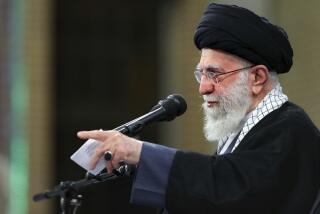Iran Tells Hussein’s Aide It Will Hold Iraqi Fliers, Planes : Diplomacy: Tehran reportedly expresses displeasure over warplane landings. Algerian, French and Yemeni officials also arrive for talks on war.
- Share via
AMMAN, Jordan — The Iranian government Thursday told a top aide to President Saddam Hussein that Tehran will hold Iraqi pilots as well as the planes they flew to Iran until the Persian Gulf War is over, Iran’s official news agency reported.
Foreign Minister Ali Akbar Velayati, meeting in the Iranian capital with Sadoun Hammadi, an Iraqi deputy prime minister, expressed displeasure that Iraqi warplanes had landed without seeking permission of the Tehran government, the Islamic Republic News Agency said. For the first time, Velayati said that the pilots would be held. Tehran had previously announced that the planes would be impounded.
It is not known why the pilots landed their warplanes on Iranian soil. In a Cable News Network interview Monday, Hussein hinted that he had ordered them there to seek refuge in the face of the allied dominance in the air war. Many analysts in the West, and some top U.S. military officers, have said they think the pilots deserted.
Hammadi arrived in Tehran late Thursday for the first face-to-face meetings between representatives of the former adversaries since the Gulf War began two weeks ago.
Ranking officials from Algeria, Yemen and France were also due in Tehran, the news agency said. All three countries had promoted peace efforts before the shooting started.
“The delegations are to hold separate talks with high-ranking Iranian officials on ways to end the war,” the Tehran report said.
Baghdad’s delegation was headed by Hammadi, a member of Iraq’s ruling Revolutionary Command Council, a tight, eight-man group led by President Hussein. Hammadi was carrying a letter from Hussein to Ayatollah Hashemi Rafsanjani, Iran’s president, the report said. He apparently traveled out of Iraq by land, crossing the border in the Iranian province of Bakhtaran, northeast of Baghdad.
The other visitors, the news agency reported, were Algerian Foreign Minister Sid Ahmed Ghozali, a deputy foreign minister from Yemen, and Francois Scheer, secretary general of the French Foreign Ministry. In Paris, a French official said that Scheer would not meet with the Iraqi delegation.
Coming on the heels of the war’s first major ground clash and the controversial flight to Iran of about 98 Iraqi planes, including sophisticated bombers and fighters, the Tehran talks were taking place in the shadow of an expanding conflict.
Some political analysts have suggested that the time might also be ripe for Hussein to cut his losses, declare his confrontation with the U.S.-led forces a victory and withdraw from Kuwait before allied bombing wrecks his military machine. But others doubt that the Iraqi president will consider withdrawing before his ground forces engage the coalition armies, if then.
Rafsanjani has followed a careful policy during the war and the preceding 5 1/2-month crisis, opposing the Iraqi occupation of Kuwait and deploring the presence of Western military forces in the Gulf region.
Despite the war raging across the Persian Gulf from its shores, Iran has stuck to a position of neutrality, marked most recently by its decision to impound the Iraqi planes.
In remarks at Tehran University prayers last Friday, Rafsanjani said it would be “suicidal” for Iran to take sides in the conflict, adding:
“We could in no way tolerate Iraq getting its hands on the Persian Gulf. How could we defend ourselves? They could make the whole Gulf insecure. . . . Not a single ship could sail to our ports.”
But other Iranian leaders have lit up the Tehran debate with anti-American rhetoric. The Ayatollah Ali Khamenei, the country’s spiritual leader, has labeled President Bush “a murderer and a criminal for massacring innocent people.”
More to Read
Sign up for Essential California
The most important California stories and recommendations in your inbox every morning.
You may occasionally receive promotional content from the Los Angeles Times.












